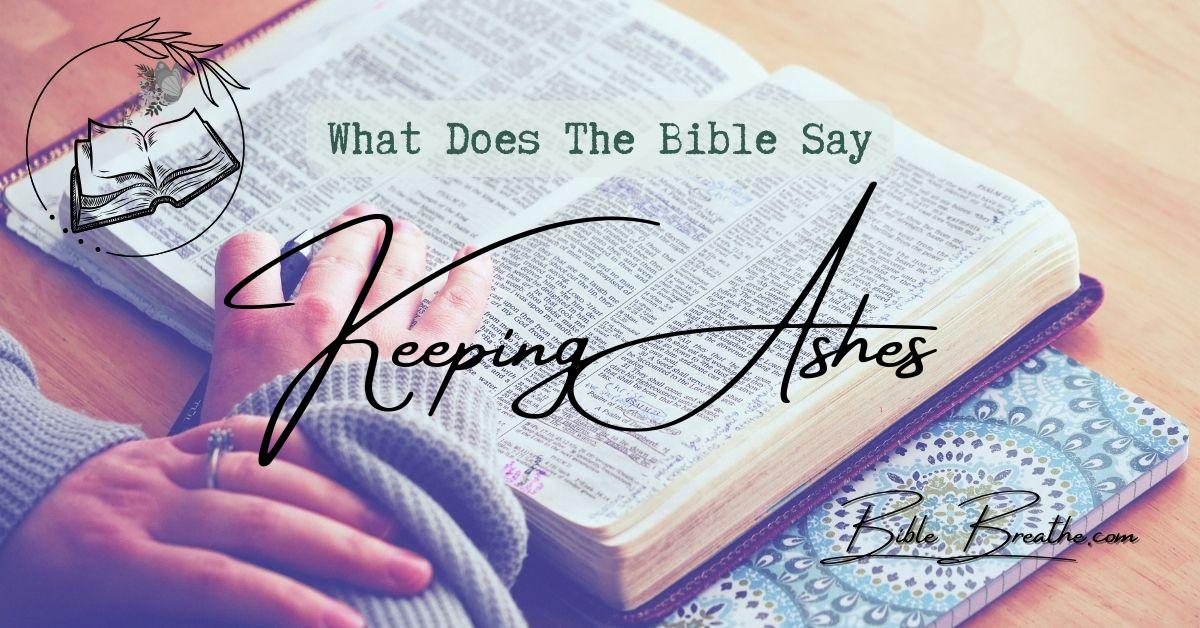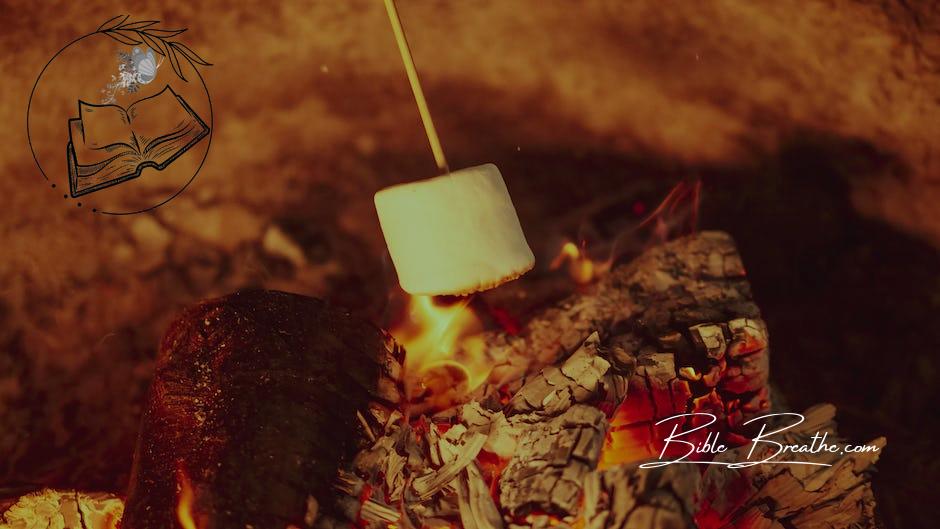What’s the scoop on the Bible’s take on keeping ashes?
Picture this: You’re standing in a room, staring at an urn, and you wonder, “What does the Bible say about this?”
Now, the Bible, it’s like a treasure chest filled with wisdom.
When it comes to keeping those ashes, it might not give a direct shout-out to modern cremation, but it does speak on things like burial and sacred rituals.
You see, it’s about honoring your loved ones, preserving those precious memories, and pondering the idea of resurrection.
So, as we take a stroll through the Scriptures, we’ll unpack what it means for Christian beliefs, how to find spiritual guidance in times of loss, and how to honor your heritage.
It’s like the Bible is our guide, helping us navigate this journey of faith and remembrance.
🌟
Key Takeaways
-
Summary of the Bible’s Stance on Keeping Ashes: The Bible does not explicitly prescribe a stance on keeping ashes after cremation. In the biblical context, burials were the primary mode of interment, and there is no direct reference to cremation or the preservation of ashes.
-
Importance of Respecting and Honoring the Deceased: While the Bible does not address the specific practice of keeping ashes, it emphasizes the importance of honoring the deceased and showing respect for their physical remains. Various biblical verses underscore the sanctity of the human body and the reverence owed to it, regardless of the form in which it is preserved.
-
Guiding Values for Dealing with Ashes: In the absence of specific biblical guidance on ashes, believers are encouraged to approach the matter with respect, reverence, and love for the departed. The core biblical principles of love, empathy, and honoring one another should guide decisions regarding the handling and preservation of remains, including ashes.
-
Cultural and Religious Practices: The handling of ashes is often influenced by cultural and religious practices within Christianity. It’s important for individuals and communities to navigate this based on their understanding of faith, their personal beliefs, and any cultural customs that align with Christian teachings of respect and reverence for the deceased.
-
Individual Interpretation and Compassion: Ultimately, the decision to keep ashes should be a matter of personal choice guided by one’s interpretation of biblical principles and their desire to respect and honor the memory of the departed in a manner consistent with their faith and beliefs. Compassion and understanding should guide interactions and conversations surrounding this sensitive issue.
Embracing the Wisdom of Keeping Ashes
Photo modified by BibleBreathe.com. Original photo by Kindel Media on Pexels
In the ever-flowing river of time, have you ever wondered why we hold on to certain things, like old photographs, ticket stubs, or even ashes?
It’s like collecting memories in a treasure chest, and the Bible has some wisdom to share about the significance of keeping ashes as a way to cherish and remember our loved ones who have departed this world.
Cherishing our Ancestors: Deuteronomy 4:9-10
“Only take heed to yourself, and keep your soul diligently, lest you forget the things which your eyes have seen, and lest they depart from your heart all the days of your life: but teach them your sons, and your sons’ sons.” – Deuteronomy 4:9 (KJV)
Think of the words in Deuteronomy like a timeless photograph album, urging us not to forget the stories of our ancestors.
Just as an old family photo can stir warm memories, these verses encourage us to hold on to the ashes of our loved ones as a tangible reminder of their lives.
It’s a way to pass down their wisdom and experiences to future generations, ensuring that their legacy endures.
The Importance of Preserving Memories: Ecclesiastes 7:2
It is better to go to the house of mourning, than to go to the house of feasting: for that is the end of all men; and the living will lay it to his heart.” – Ecclesiastes 7:2 (KJV)
Ecclesiastes teaches us that there’s wisdom in contemplating the end of life, just as we appreciate the beauty of a sunset.
Keeping ashes is like preserving the sunset of a loved one’s life—a reminder that, just as the sun dips below the horizon, our loved ones have moved on to a different place.
Their ashes become a symbol of reflection and remembrance.
In a world filled with fleeting moments, the Bible encourages us to hold onto the tangible remnants of those who have left us.
It’s not merely about the ashes themselves but the memories, teachings, and values they represent.
As we embrace the wisdom of keeping ashes, we honor our ancestors, remember the dearly departed, and pass down a legacy that transcends time.
So, do you have a treasured keepsake that reminds you of someone special in your life?
The Bible’s Take on Keeping Ashes
Photo modified by BibleBreathe.com. Original photo by Narin Chauhan on Pexels
Ever thought about what the good book has to say about keeping ashes?
Well, let’s take a journey into the Scriptures and see what wisdom we can uncover.
Back in the Day: Origins and Traditions
Back in the day, when our biblical ancestors bid farewell to their loved ones, cremation wasn’t the go-to method.
The Bible recounts various burial practices, like when Abraham was laid to rest in a cave or how Jacob got embalmed in Egypt.
Cremation wasn’t all the rage in those times.
It’s like flipping through the family album and seeing how traditions have changed over the years.
“And Joseph commanded his servants the physicians to embalm his father: and the physicians embalmed Israel.” – Genesis 50:2 (KJV)
Changing Tides: Modern Practices and Reflection
Time marches on, and so do our customs regarding death and burial.
Here’s the scoop: the Bible doesn’t put its foot down on cremation.
Instead, it focuses on giving respect and honor to those who have passed away.
So, how do we fit cremation into this biblical puzzle?
In today’s world, cremation has become a common choice for many, often influenced by practical reasons or personal beliefs.
It’s kind of like how we’ve embraced smartphones and the internet while still holding onto our core values and traditions.
“For dust thou art, and unto dust shalt thou return.” – Genesis 3:19 (KJV)
A Biblical Perspective on Cremation
Photo modified by BibleBreathe.com. Original photo by Narin Chauhan on Pexels
Here’s the bottom line: the Bible doesn’t hand us a user manual for handling human remains.
What it does emphasize is the importance of showing love and respect to those who have passed.
Whether it’s through the classic burial or the path of cremation, what really matters is our intention – honoring the memory of our loved ones.
In the grand scheme of things, it’s not about the method but the heart behind it – ensuring that our actions align with the principles of love, reverence, and the spiritual guidance that the Scriptures illuminate.
Remember, the Bible isn’t always about giving us a clear yes or no; it nudges us to ponder our choices through the lens of our faith and values.
So, my friend, when it comes to keeping ashes, let love and respect be your guiding stars.
The Modern Cremation Process: A Contemporary Perspective
Photo modified by BibleBreathe.com. Original photo by Kindel Media on Pexels
In our fast-paced and ever-changing world, even the age-old practice of handling the remains of our loved ones has evolved.
It’s like seeing the shift from classic vinyl records to streaming music online – things change, but they still hold value.
Let’s delve into the contemporary cremation process and see how it differs from the biblical era.
Steps Involved in the Cremation Process Today
Today’s cremation process is like a carefully choreographed dance.
It begins with the respectful preparation of the deceased, including removing any non-combustible items like jewelry or prosthetics.
The body is then placed in a specially designed chamber, often called a cremation furnace or retort.
Inside this chamber, intense heat, often exceeding 1,800 degrees Fahrenheit, is applied.
This extreme heat causes the body to break down into its basic elements, leaving behind bone fragments.
These fragments, known as cremated remains or ashes, are carefully collected and processed to ensure that they are reduced to a fine, powdery consistency.
How it Differs from Ancient Practices
In biblical times, cremation was not as common as it is today.
The Bible mostly talks about burial as the traditional way of handling the deceased.
Many biblical figures, like Abraham and Sarah, found their final resting place in family tombs or designated burial grounds.
While modern cremation is a technological process designed for efficiency and space-saving, ancient practices were more focused on the connection between the living and the deceased.
Burial was seen as a way to return the body to the earth, emphasizing a sense of continuity and the hope of resurrection.
In contrast, modern cremation tends to be more secular and practical when it comes to dealing with the deceased’s remains.
However, it’s important to remember that the Bible doesn’t explicitly condemn or endorse cremation, leaving the choice to individuals and their beliefs.
In the tapestry of life, both ancient and modern practices have their place, like different colors on an artist’s palette.
They reflect the cultural and spiritual beliefs of their respective times.
As we navigate the complexities of honoring our loved ones in today’s world, we can appreciate the evolving nature of customs and rituals while still drawing wisdom and inspiration from the teachings of the Bible.
It’s all part of the journey, isn’t it?
New Testament Insights: What’s the Bible’s Take on Keeping Ashes?
Photo modified by BibleBreathe.com. Original photo by Kindel Media on Pexels
If you’re curious about what the Bible has to say about keeping ashes, let’s set our compass to the New Testament.
This part of the Good Book offers interpretations and teachings that can help us unravel this intriguing topic.
New Testament Perspectives
The New Testament gives us a fresh perspective on the whole ashes deal.
While it doesn’t lay down a strict rulebook for cremation, it shines a light on spiritual truths and the significance of our actions.
Take, for instance, the story of Jesus’ crucifixion and resurrection.
His body was placed in a tomb, not turned into ashes.
This was in line with the burial practices of that time.
But, the New Testament doesn’t dwell on the mechanics of how His remains were handled; it zooms in on the profound spiritual meaning of His sacrifice and resurrection.
For I delivered unto you first of all that which I also received, how that Christ died for our sins according to the scriptures; And that he was buried, and that he rose again the third day according to the scriptures.” – 1 Corinthians 15:3-4 (KJV)
Jesus’ Teachings and What They Mean for Us
When we delve into the teachings of Jesus, we find a goldmine of wisdom that can guide us.
He spoke of love, compassion, and the infinite worth of every human soul.
While He didn’t give us a lecture on cremation, His teachings emphasize that our actions should reflect these core principles.
Imagine if Jesus were right here with us today.
He might nudge us to contemplate why we want to keep those ashes.
Is it to honor the cherished memory of a loved one?
To find comfort in their enduring presence?
To hold on to the valuable lessons they taught us, much like how we treasure the teachings of the Bible itself?
“A new commandment I give unto you, That ye love one another; as I have loved you, that ye also love one another.” – John 13:34 (KJV)
Pondering the New Testament Wisdom
Photo modified by BibleBreathe.com. Original photo by Pavel Danilyuk on Pexels
In the New Testament, we discover guidance that goes beyond specific rituals or customs.
It directs us to embody the love, respect, and compassion that Jesus exemplified.
Whether we opt for cremation or follow the traditional burial path, what truly counts are our intentions and how we honor the memory of our loved ones in line with the teachings of Christ.
So, as you mull over the question of keeping ashes, remember that the New Testament encourages us to infuse our actions with love, compassion, and the lessons of Christ, guiding us toward a deeper understanding of what really matters.
Insights from the Old Testament: A Biblical Perspective on Keeping Ashes
As we journey through the pages of the Old Testament, it’s like stepping into a museum of ancient wisdom, where each exhibit reveals layers of understanding about the practice of keeping ashes.
These passages provide a biblical perspective on this age-old custom and shed light on its significance.
References from the Old Testament
While the Bible doesn’t have a specific chapter on keeping ashes from cremation, it does contain passages that offer wisdom and guidance related to death, burial, and the preservation of memory.
**1.
Abraham’s Burial:** In Genesis 23, we find a heartwarming account of Abraham purchasing a burial site for his beloved wife Sarah.
This act reflects the importance of proper burial and the deep respect shown towards the deceased in biblical times.
**2.
The Valley of Dry Bones:** Now, let’s talk about Ezekiel 37, where the prophet Ezekiel has a vision of a valley filled with dry bones.
It’s like a scene from a supernatural thriller!
But it’s actually a powerful metaphor for God’s ability to restore and resurrect the dead.
This passage emphasizes the concept of resurrection, which has profound implications for how we view the remains of the deceased.
Interpretations and Their Significance
Even though the Old Testament doesn’t have a section dedicated to cremation or keeping ashes, it nudges us to ponder the importance of honoring our ancestors and preserving their memory.
Keeping ashes can be seen as a modern way to live out these biblical principles.
When we hold onto the ashes of our loved ones, we’re essentially preserving a part of their earthly journey.
It’s like having a scrapbook filled with their stories and wisdom.
Just as the Bible underlines the significance of remembering and cherishing the tales of our ancestors, keeping ashes becomes a tangible way to remind ourselves of the lives they led and the lessons they left behind.
Moreover, the idea of resurrection, as illustrated in Ezekiel’s vision, whispers to us about the hope and belief in life beyond this earthly existence.
While the physical body might return to ashes, the spirit endures, offering comfort and solace to those who are grieving.
In the grand narrative of the Old Testament, we discover a treasure trove of teachings and principles that guide us in how we approach the practice of keeping ashes.
It encourages us to honor our ancestors, preserve their memory, and hold onto the hope of resurrection, drawing strength and wisdom from the timeless words of scripture.
So, have you ever thought about how these ancient teachings resonate with your own beliefs and experiences?
Christian Funeral Traditions: Keeping Ashes Across Denominations
When it comes to the topic of keeping ashes, Christian funeral practices are like a tapestry woven with various threads of interpretation, reflecting the diversity of beliefs across different denominations.
Let’s unravel this tapestry and explore the distinct approaches and shared rituals within the Christian family.
Diverse Approaches in Christian Denominations
Christianity is a mosaic of denominations, each with its unique customs and interpretations.
Some Christian groups embrace cremation and the preservation of ashes as a way to honor and remember the departed, considering it a practical and respectful choice.
Others lean toward traditional burial, emphasizing the symbolism of returning to the earth, echoing the biblical idea of “ashes to ashes.”
“Then shall the dust return to the earth as it was: and the spirit shall return unto God who gave it.” – Ecclesiastes 12:7 (KJV)
Shared Traditions and Rituals
Across these denominations, certain common practices and rituals prevail during Christian funeral services involving ashes.
These rituals typically include prayers, readings from the Bible, hymns, and heartfelt eulogies.
The aim is to offer solace to the grieving and to celebrate the life of the departed soul.
Imagine a Christian funeral service as a beautiful mosaic artwork, with each tradition and ritual piece contributing to a meaningful whole.
Just as various elements come together to create a stunning image, these elements in a Christian funeral service combine to provide comfort and spiritual guidance.
Blessed are they that mourn: for they shall be comforted.” – Matthew 5:4 (KJV)
Embracing Diversity in Christian Funeral Practices
In the realm of Christian funeral practices, there’s room for diversity and personal choice.
Whether one chooses to keep ashes or opt for a traditional burial, the common thread is the Christian belief in honoring the memory of the departed and finding solace in their faith.
As you grapple with the decision of keeping ashes within your Christian tradition, keep in mind that the Bible encourages values such as love, respect, and the solace of spiritual guidance during times of mourning.
These core principles can serve as your compass, guiding you through the specific practices of your denomination.
Frequently Asked Questions (FAQs) About What Does The Bible Say About Keeping Ashes
Is it right to keep ashes of a human body according to the Bible?
The Bible doesn’t specifically address the practice of keeping ashes, but it doesn’t forbid it either.
It’s a personal choice and should be done with respect and in accordance with local laws and customs.
What does the Bible say about scattering of ashes?
The Bible doesn’t specifically address the scattering of ashes, as this is a modern practice.
Traditionally, burial was the norm, but the Bible’s focus is on the resurrection of the dead and eternal life, not the handling of ashes.
Decisions about ashes should reflect respect and reverence for the deceased.
How does the Bible describe the resurrection and the dead being raised?
The Bible depicts the resurrection as a pivotal event, signifying the restoration of life.
1 Corinthians 15:52 describes it as a moment when the dead will be raised imperishable, transformed to incorruptible bodies.
The resurrection assures believers of life after death, offering hope and comfort.
Jesus’ resurrection serves as a cornerstone of Christian faith, validating the promise of eternal life.
Is traditional burial or keeping ashes the better option in the Bible?
The Bible doesn’t prescribe a specific method of burial, leaving the choice to cultural and personal preferences.
Both traditional burial and keeping ashes can align with Christian principles, emphasizing the hope of resurrection.
The key lies in honoring the deceased with reverence and maintaining a perspective that reflects Christian beliefs in life after death.







